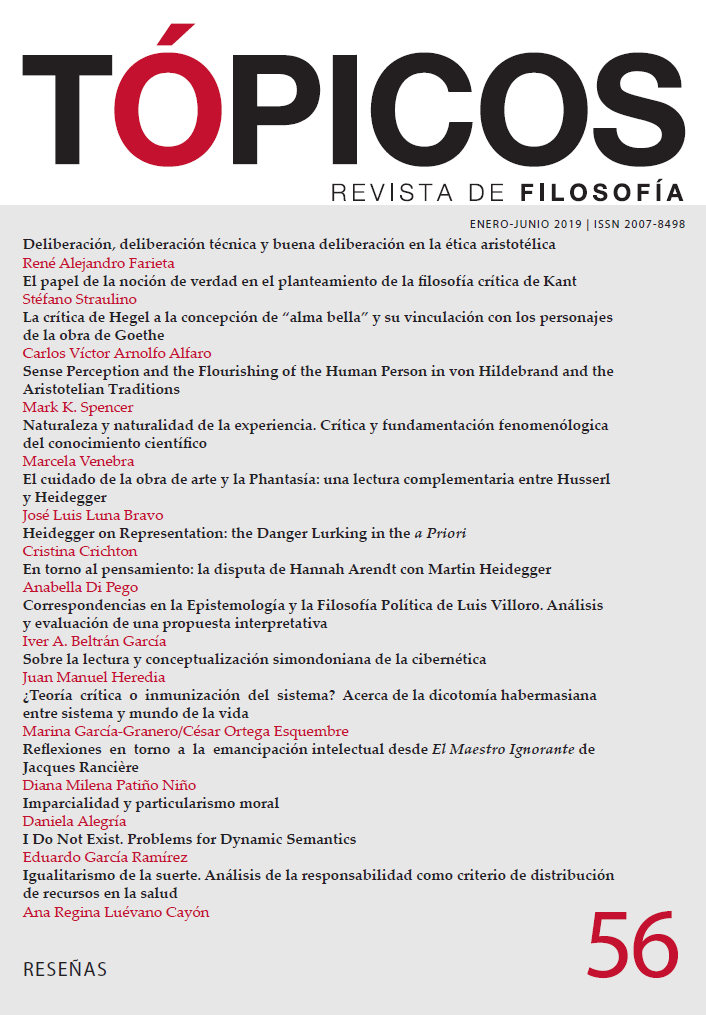Publicado 2018-12-13
Palabras clave
- igualitarismo,
- suerte,
- justicia distributiva,
- salud
Cómo citar
Resumen
En este trabajo me aproximo desde la perspectiva del igualitarismo de la suerte al problema de la justicia distributiva en el campo de la salud. Para ello, me basaré en algunos de los postulados de Ronald Dworkin y Shlomi Segall sobre los que descansa el origen del igualitarismo de la suerte. Si bien es cierto que Rawls al proponer el principio de la equitativa igualdad de oportunidades intentó mitigar las desigualdades sociales que son consecuencia del azar para algunos filósofos igualitaristas, como Ronald Dworkin, al no considerar el binomio libertadresponsabilidad el argumeto rawlsiano resultaba poco equitativo y decidieron desarrollar otra rama del igualitarismo que permitiera distinguir a la persona de sus circunstancias. Por ello la consideración de la responsabilidad como criterio de distribución para los recursos sanitarios será puesta a prueba y analizada en tres puntos. En primer lugar, expondré los aspectos generales del igualitarismo de la suerte y definiré la postura de Daniels y Segall respecto a la asistencia sanitaria. En segundo lugar, retomaré la distinción que hace Dworkin entre “suerte bruta” y “suerte opcional” y expondré su propuesta sobre la igualdad de recursos así como su modelo sanitario sustentado en el binomio libertad-responsabilidad. En tercer lugar, analizaré la relación entre libertad y responsabilidad en el cuidado de la salud. De este modo, pretendo demostrar las ventajas y desventajas que se pueden seguir de tomar la responsabilidad individual como criterio de distribución de recursos.
Referencias
- Arneson, R. (2000). Luck-Egalitarianism and Prioritarianism. Ethics, 110, 2, 339-49.
- ----(1999). Egalitarianism and Responsability. Journal of Ethics, 3, 22-47.
- Cohen, G. A. (1997). Where the action is: On the Site of Distributive Justice. Philosophy and Public Affairs, 26, 1, 3-30.
- Daniels, N. (1985). Just Health Care. Nueva York: Cambridge University Press.
- ----(1990). Equality of what: Welfare, Resources or Capabilities? En Philosophy and Phenomenological Research, 50, Supplement (Autumn, 1990).
- ----(2003). Rawl´s complex egalitarism. En The Cambridge Companion to Rawls. Freeman, S. (ed.) Nueva York: Cambridge University Press.
- ----(2012). Just Health. Meeting Health Needs Fairly. Nueva York: Cambridge University Press.
- De Lora, P. (2007). Justicia distributiva sanitaria ¿penalizar al enfermo “culpable” de su condición? HUMANITAS. Humanidades Médicas, 22, Diciembre, 1-14.
- De Lora, P. y Zúñiga Fajuri, A. (2009). El derecho a la asistencia sanitaria. Un análisis desde las teorías de la justicia distributiva. Madrid: Iustel.
- Dieterlen, P. (1981). What is equality? Part 2: Equality of resources. En Philosophy and public affairs, 10, 4 (Autumn).
- ----(1993a). Ética privada e igualitarismo político. Barcelona: Paidós.
- ----(1993b). Justice in the distribution of Health Care. En McGill Law Journal. Revue de droit de McGill, 38, 4, 883-898.
- ----(2000). Sovereign Virtue. The Theory and Practice of Equality.Cambridge, Mass: Harvard University Press.
- ----(2015). Justicia distributiva y salud. México: Fondo de Cultura Económica.
- Luévano Cayón, A. R. (2016). Justicia Sanitaria. Las teorías de la justicia distributiva aplicadas al ámbito de la salud (Tesis doctoral). Madrid, España: Universidad Complutense de Madrid.
- Pereira, G. (2004). Medios, capacidades y justicia distributiva. México: UNAM- Instituto de Investigaciones Filosóficas.
- Puyol, A. (2004). La herencia igualitarista de John Rawls. En Isegoría, 31, 115- 130.
- ----(2010). Salud y justicia global. En Isegoría, 43, julio-diciembre, 479-502.
- Rakowski, E. (1991). Equal Justice. Oxford: Clarendon Press. Citado por De Lora, P. y Zúñiga Fajuri, A. (2009). El derecho a la asistencia sanitaria. Un análisis desde las teorías de la justicia distributiva. Madrid: Iustel.
- Rawls, J. (1995). Teoría de la justicia. México: Fondo de Cultura Económica.
- Roemer, J. (1994). Egalitarian Perspectives. Cambridge: Cambridge University Press.
- ----(1998). Equality of Opportunity. Cambridge, Mass.: Cambridge University Press.
- Segall, S. (2010). Health, luck and Justice. Princeton: Princeton University Press.
- Wikler, D. (1987). Personal responsibility for Illness. En Van DeVeer, D, y Regan, T. (eds.) Health Care Ethics. An Introduction. Philadelphia: Temple University Press. Citado por Pablo De Lora (2007): Justicia distributiva sanitaria ¿penalizar al enfermo “culpable” de su condición? HUMANITAS. Humanidades Médicas, 22, Diciembre, 1-14.
- Fuentes electrónicas
- INEGI. Estadística a propósito del Día de muertos. (30 de octubre, 2017) En: <https://www.inegi.org.mx/saladeprensa/aproposito/2017/muertos2017_Nal.pdf> [Fecha de consulta: 2 de enero de 2018].
- Muñoz-Hernández, O. (2006). Programas Integrados de Salud (PREVENIMSS). Revista Médica del Instituto Mexicano del Seguro Social [en linea], 44, (Supl. 1), S1-S2. [Fecha de consulta: 1 de marzo de 2015]. Disponible en: < https://www.redalyc.org/articulo. oa?id=457745537001>. ISSN 0443-5117.
- OMS. Informe sobre la salud en el mundo 2012. (s.f.) [Fecha de consulta: 2 de enero 2018]. En: <https://www.who.int/rpc/whr2012-stories/es/>
- ObamaCare. (2014). [Fecha de consulta: 15 de noviembre de 2015]. En <https://obamacarefacts.com/obamacare-facts/>






